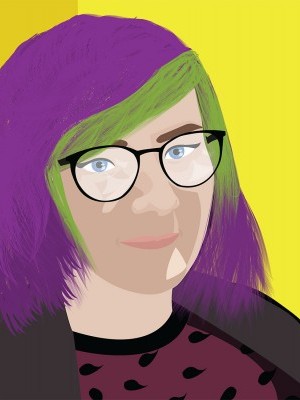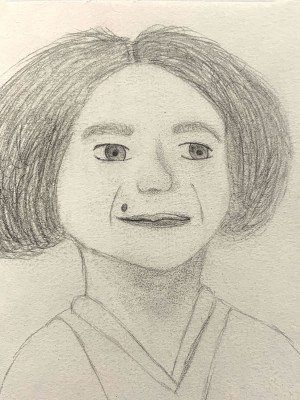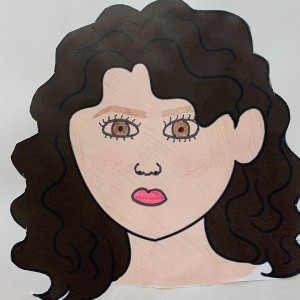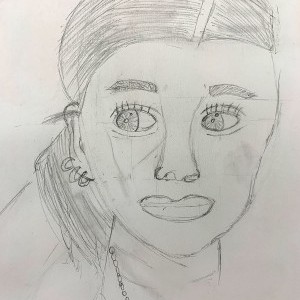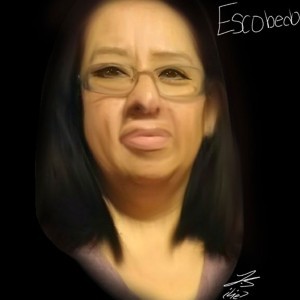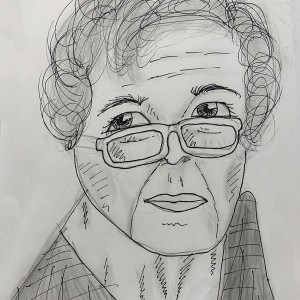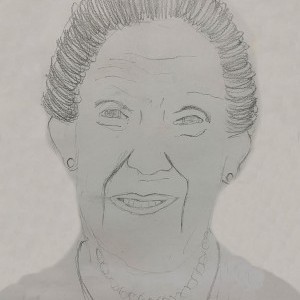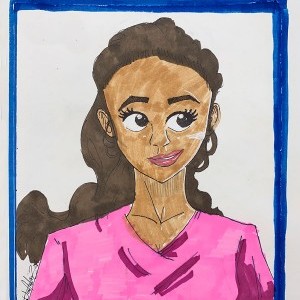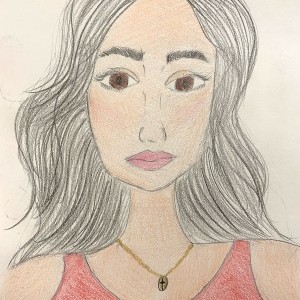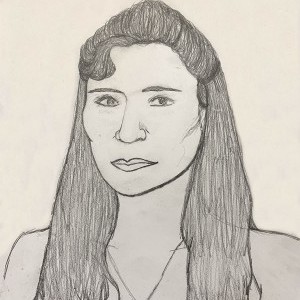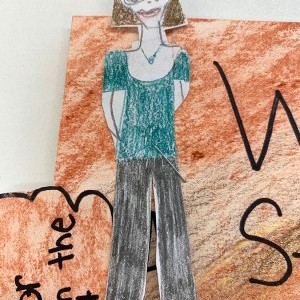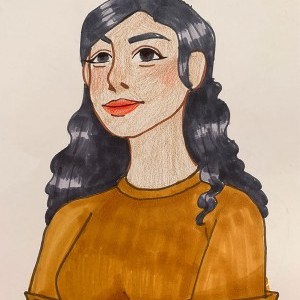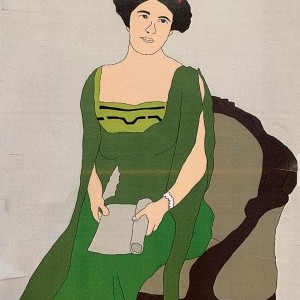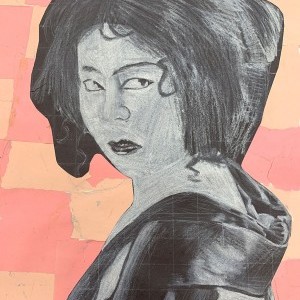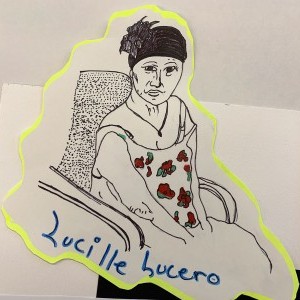Catherine Brusseau
Kunsmiller Creative Arts Academy | Denver, CO | 11th Grade
Inspirational Family Member
My Grandma
My family is from Germany, half from Munich and half from Berlin. In the 1930s, Germany was going through East and West segregation. On my mom’s side, they were supremacists (Nazis), on my dad’s side, they are Jewish. My grandma and great-grandma were in concentration camps; my grandma was also pregnant with my aunt then. My great-grandma eventually got killed in the camps by gas chamber and my grandma was pregnant during this time. One guard, who ended up being my mom’s great-uncle, was the commander of the camp, he was sliding my grandma’s food in secret. He ended up helping her escape the camp, and she went to a village nearby where others were hiding, but she took his iron cross to remember him by. While she was in hiding, she wrote to her husband, after learning which camp he was in, telling him where she was; she didn’t want to leave Germany without him. She gave birth to my aunt and my grandpa somehow got the letter from her while in the camp. The camp ended up getting overrun by the Soviet Union who freed the prisoners, including him. Many people died due to malnourishment and he was very sick due to it. He found his wife and daughter, who was 2 when he first saw her, then my grandma got pregnant with my dad. They decided to leave Germany and they found a boat where, if you paid a crooked man on the ship, he would give you a ride to America. They robbed people to get on the boat and they ended up traveling for 3 weeks. The trip was terrible, many people were sick or dying. My grandpa became partially blinded by the coal smoke. There was much abuse and sexual assault on the boat, and when they arrived in the Northern part of America, they had to take a longer way to avoid getting the boat searched. They thought the trip was worth it because they would get their freedom, but when they arrived, they thought it was no different than Germany, they were treating black people like they had the Jewish people in Germany.
Historical Figure I Admire
Lucy Stone
“I think, with never-ending gratitude, that the young women of today do not and can never know at what price their right to free speech and to speak at all in public has been earned.” Lucy Stone was a suffragist born on August 13, 1818, in West Brookfield, Massachusetts. She was born into a family of 9 children, and was constantly frustrated watching only men get an education in her family. This helped fuel her passion for equality. This passion led to Lucy Stone being the first woman to get a college degree in the State of Massachusetts. Also, in another show of personal agency, she was the first woman to keep her maiden name after marriage. Ms. Stone’s desire for equality led her to, also, work for universal suffrage for women, and in 1920, the 19th Amendment was passed and added to the United States Constitution, officially making the denial of the right to vote based on sex illegal.
Lucy grew up in a farmhouse with her many siblings, and she was frequently discouraged because her brothers could leave home to get an education; however, due to her gender, she could not. Nevertheless, through fierce determination, she ended up going to college and turning down opportunities like writing speeches only men would be allowed to read. She also started a movement by making her wedding a sort of protest against traditional marriage. In her vows, she left no doubt that she was not about to conform to the role of women staying at home, and that she was going to keep her last name. Furthermore, this act of defiance against traditional values shows clearly that she was her own person who felt entitled to the same rights and privileges as men. She came from a family that believed in equality but they did not necessarily actively fight for women's rights. Watching her brothers go to school, and being rejected when it came to her aspirations of public speaking took a toll on her. She ended up persevering and became the first woman to get a degree in Massachusetts. Being told no and watching her brothers go to school and having the support of her family prompted her to go out and achieve anything she wanted no matter what anyone said.
Stone did many progressive things like keeping her maiden name after getting married, she helped organize the first national Woman's Rights Convention in Worcester, Massachusetts and she fought to get an education in public speaking. She helped women take a stand against marriage and allowed them to keep their rights like getting a job if they really wanted to, not conforming to the beliefs that women should stay at home and giving women the power and voice to keep their maiden name or decide that they don’t need to get married. She encouraged women to stand up for themselves, and while she was not the only one, her helping women take back their marital and social freedom definitely helped the movement they all set out to make. Lucy probably impacted many women during this time, considering divorce rates skyrocketed and women were allowed to vote in 1920. She had much influence on the women around her. It allowed women to express what they wanted and actually do it for the first time in American history. She gave women the power to leave a relationship if they were unhappy and made them see that they didn’t have to worry about relying on men for everything. It helped strengthen women and give them a voice. It helped women then to obtain their rights, and it is helping us in maintaining our rights.
What the Project Means to Me
Voting is very important, that's how you make change and real progress. Every single vote matters, every right we have nowadays is because of voting. I started caring because it affects my direct surroundings, and gives you the power to make important decisions that will impact you and future generations. But, who’s to say that the choice will be right in the future? Which is why we get the opportunity to change it, and add on to it down the line. I think that it isn’t fair that I couldn’t vote last election, not only because I want my voice to matter, but because I wasn't educated on how the process works or what I wanted. When I turned 18, there was a lot going on politically and culturally; a lot of activists fighting, like for more rights for the LGBTQ+ community. There's more to vote on that I’m aware of now compared to before I was 18. I have been discriminated against trying to vote because I was 17 at the time of the last election. I was also told I shouldn’t vote because certain subjects didn’t affect “my group.” In the 40s, my grandparents also were denied the right to vote due to being Jewish. They were from Germany; and they weren’t allowed rights even after World War II. They were treated like the black people of America during the time, and they eventually got their rights from voting, too. All elections are just as important, because the State will directly impact people almost immediately. That’s why people should look up bills getting passed and be educated about different elections.
Explore the Archive
More From This Class
Click on the thumbnails below to view each student's work.Deadline Extended
There's still time to join Women Leading the Way.
Become a part of our storytelling archive. Enroll your class today.
Join the Project

